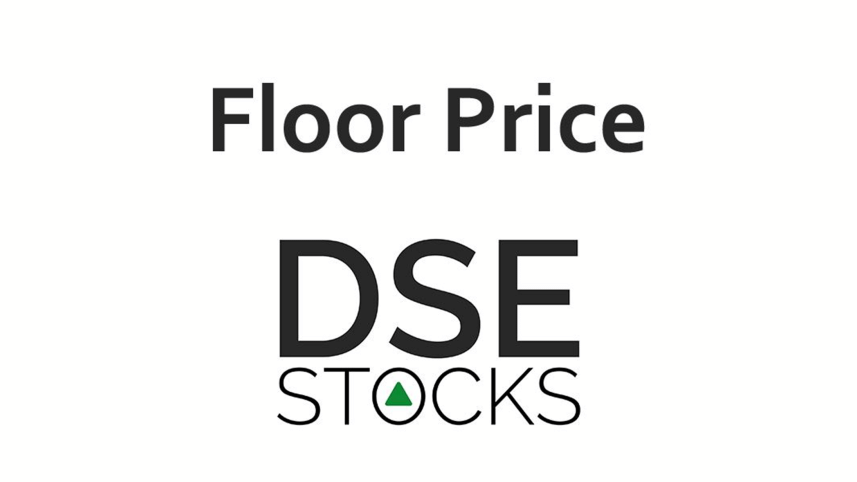Stock market in a bad patch for floor price

The stock market of Bangladesh has been going through a bad patch for a year due to the presence of floor price, with political and macroeconomic uncertainties worsening the situation.
The floor price led to the creation of a barren equity market alongside tension for both stock market intermediaries and investors. The reason is that the investors are unable to sell their shares while the intermediaries are struggling to earn any commission income for the floor price, according to stock market analysts.
The Bangladesh Securities and Exchange Commission (BSEC) set the floor price of every stock in July of 2022 to halt the freefall of the market indices amid global economic uncertainties. The floor price was the average of the closing prices on July 28 of the year and the preceding four days.
The stock market has remained depressed for the past one year mainly for the floor price while political and economic uncertainties aggravated the tension, said Prof Abu Ahmed, a stock market analyst.
"Floor price is an uncommon thing for any stock market in the world and its imposition was a wrong decision," he said.
Some investors had initially welcomed the decision but now they are also realising that it is creating a problem for all, he said.
Some investors are closing their beneficiary owner (BO) accounts on incurring losses for months, said Ahmed, who is a former chairman of the economics department at the University of Dhaka.
The number of BO accounts dropped 5 per cent to 17.44 lakh over the past year, shows data of Central Depository Bangladesh Ltd.
Political tension is now gripping investors. If an inclusive and acceptable national parliamentary election takes place, peoples' confidence will be restored and foreign investors will invest again, he added.
The floor price was imposed to safeguard general investors amid global economic uncertainties in the aftermath of the Russia-Ukraine war, said Sharif Anwar Hossain, a former president of DSE Brokers Association.
But now it has turned detrimental to the interests of general investors as they are unable to sell their shares, he said.
Due to the lack of buyers, investors' funds are stuck in most cases while stock market intermediaries are also passing a challenging period as their income from commissions dropped by a massive extent, he said.
The stock market regulator is saying that the floor price will be lifted once the economy returns to a comfort zone but there is no saying when that will come about, he added.
Average daily turnover of the Dhaka bourse fell 30 percent to Tk 413 crore last week whereas it was Tk 592 crore in the preceding week.
In the past one year after the launch of the floor price, average turnover of the DSE came down to less than Tk 600 crore whereas it was around Tk 1,475 crore in the previous year, according to the DSE data.
Due to the floor price, buyers are reluctant to purchase shares as existing prices of the stocks are artificially high according to their estimates, according to a top official of a stock brokerage firm.
So, there are very few buyers for most stocks of the market, he said, preferring not to be named apprehending "trouble" from the stock market regulator for commenting on the floor price.
"Only some of the stocks were traded in the past one year…most of them are companies with poor performance records…prices of the rest remained the same for the lack of trade," he said.
Of the 397 listed companies, more than 200 has had their stocks stuck at the floor price with no trade taking place over the past year, the DSE data shows.
In this situation, only a few stock brokerage firms accounted for the daily turnover of the DSE. So, most brokerage firms, especially those owned by individuals, are struggling to bear operational costs, said the stock broker.
"Floor price is now a double-edged sword for both investors and stock market intermediaries," he added.
The stock market investors are facing problems because they cannot sell shares even when they are willing to give in to low prices, said Tajul Islam, a retired government official who is now a stock market investor.
"In the last one year, I could not trade any of my shares although I have shares worth Tk 18 lakh," he said.
The stock market regulator has no option but to lift the floor price to save the intermediaries, even if it causes the stock market index to plunge by a big margin. "The floor price is now a big problem," he said.
"It (floor price) was imposed to safeguard general investors. Now we are also eagerly waiting for a suitable time to lift the provision," said Mohammad Rezaul Karim, spokesperson of the regulator.
Once it is understandable that the capital of investors no longer needs to be protected and that no crash of the stock market will recur, the BSEC will lift the floor price, he added.




 For all latest news, follow The Daily Star's Google News channel.
For all latest news, follow The Daily Star's Google News channel.
Comments